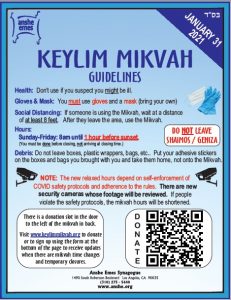 I. Summary — The Parsha sets forth many basic civil laws, including:
I. Summary — The Parsha sets forth many basic civil laws, including:
A. The Humane Treatment of Slaves:
(a) A Jew sold into slavery as restitution for a theft must be freed after a maximum of six years;
(b) If he married when entering slavery, the master must support his Jewish wife and children and free all of them at the end of his servitude;
(c) If a master provides him with a woman slave, she and their children remain with the master after he’s freed; if he remains so attached to them that he insists on staying with them after he’s freed, he must make a declaration before the judges to that effect and have his ear pierced with an awl, whereupon he remains in servitude until the Jubilee (50th) year;
(d) A man may “sell” his daughter to be a maidservant until she is 12 years old (Chazal make clear that this is only to be invoked for her benefit — i.e., he is only permitted to “sell” her if the sale is expected to result in her marriage to either her master or his son; even is such circumstances, however, the Talmud notes that this is only done when it is an opportunity to provide for her future which would otherwise not be available); if she displeases her master, she can’t be resold to a foreigner, but may be redeemed by her relatives; if the master’s son marries her, she is treated as a free-born Jewess; she can’t be denied her marital rights if the master/his son marries another woman, in which event she goes free;
(e) If a man strikes and kills his non-Jewish slave, he’s punished by the judges; if, however, the slave dies after a day or two, he’s not punished since it’s assumed he didn’t intend to kill the slave; if he maims the slave, the slave is immediately freed.
B. Death Penalty is imposed for: willful murder (if accidental, he can escape the vengeful survivors by fleeing to a City of Refuge), cursing a parent with Hashem’s name, kidnaping, practicing witchcraft, bestiality and idol sacrifice.
C. Tort Law
(1) Personal injury: (a) If one injures another during a fight, he’s liable for his loss of earning, medical expenses and pain, embarrassment and physical injury; (b) If during a fight one accidentally strikes a third party pregnant woman and cause her to miscarry, one is liable for damages: “an eye for an eye, a tooth for a tooth . . . ” (which, while commonly misunderstood, means the monetary value of an eye, etc.); (c) If the owner of a dangerous animal fails to take proper precautions and the animal kills a person, the animal is killed and the owner is punished; (d) If an animal kills a non-Jewish slave, the slave’s owner is given 30 shekels of silver.
(2) Property damage/Theft:
(a) If animal dies after falling into an uncovered pit, its owner is entitled to its value (minus the value of its carcass);
(b) If one’s ox kills another’s ox, the surviving ox is sold and the owners divide the proceeds from both oxen;
(c) If one steals and slaughters or sells an ox, he must pay 5 times its value to its owner (4 times its value for a sheep); if the thief is found with the animal in his possession, he pays double;
(d) It is justifiable homicide to kill a burglar in your home at night, but murder to do so during the day;
(e) A thief who is too poor to offer repayment is offered into slavery;
(f) When one knowingly allows his animal to wander into another’s field or vineyard and cause damage, the best parts of his field are evaluated as the basis for assessing the restitution; a similar penalty is assessed on one who lights a fire and allows it to spread to his neighbor’s property;
(g) If money/property entrusted to the care of non-paid individual is stolen, the owner may be paid double its value; such amount is to be paid by the thief (if he is caught), the trustee (if he is caught or is found guilty of embezzlement), or by witnesses who falsely accuse the trustee of having the object in his possession; the trustee can absolve himself from liability by taking an oath that he isn’t responsible for the loss;
(h) When an animal entrusted to a paid watchman for safekeeping dies, is injured or is carried off by robbers, the trustee can take an oath that he wasn’t responsible; if it was stolen, he’s responsible; if the animal is mauled by wild beasts, the trustee isn’t liable if he can produce the carcass; and
(i) A borrower is responsible for the borrowed animal’s death or injury, unless the owner is present at the time of the accident.
D. Treatment of strangers, widows and orphans. A stranger (which Chazal explain refers to a convert, although it obviously can include any other stranger) isn’t to be wronged or insulted in any way “for the Jews were strangers in Egypt”. Similar consideration must be shown to widows and orphans.
E. Loans. Loans between Jews must be interest-free; if one takes a garment which is used as a blanket at night for a pledge, he must return the garment to its owner before sunset.
F. Perversion of justice. The perversion of justice can be the greatest danger to the survival of a civilized society; it can be caused by the following: a witness giving false evidence on behalf of a guilty individual; a witness not remaining firm in upholding righteousness but instead following the majority in the wrong; a judge administering justice on a partial basis; a judge accepting a bribe.
G. Helping others. One must extend a helping hand to a fellow Jew, even if there is a rivalry between them. If one comes upon a rival’s lost animal, he must return it to its original owner. Similarly, if one finds an animal lying helplessly under its burden, one should assist it and ease its pain.
H. First fruit/born. The first fruits and produce of land and vineyards must be offered to Hashem; similarly, the firstborn of men of animals are to be dedicated to Him.
I. Other laws: the prohibition against eating Treifeh (the meat of an animal torn by beasts in the field); the Shemitta (7th) year, during which the land is to lie fallow; the complete abstention from work on Shabbos; the pilgrimage to Israel on the three Festivals (Pesach, Shavous and Sukkot); the prohibition against seething a kid in its mother’s milk.
J. Hashem’s concluding message: Hashem promises the Jews that if they obey the Divine law, He will support them in their gradual conquest of Canaan, and their victory will be assured.
K. Moshe goes up to Mt. Sinai: Moshe returned from the heights of Mt. Sinai and, after writing down all of the precepts conveyed to him by Hashem, offered sacrifices and read the Book of the Covenant to the Jews, to which they instantly responded “All that Hashem has spoken we will do and we will hear”. At Hashem’s bidding, Moshe, Aharon, Nadav and Avihu, together with the 70 Elders, ascended the mountain, where they witnessed a mystical vision of the Divine Glory. After their descent, Moshe was summoned alone to receive the 2 tablets of stone on which Hashem had inscribed the 10 Commandments so that they could be taught fully to the Jews, while Aharon and Chur were left to govern in his absence. Followed by Yehoshua (who remained on the lower part of the mountain), Moshe ascended Mt. Sinai, which was surrounded by a cloud. He then passed into the mists of the cloud and remained on the mountain for 40 days and 40 nights.
II. Divrei Torah
A. Artscroll Chumash
Civil law. The juxtaposition of this Parsha (dealing primarily with civil and tort law) with the 10 Commandments provides a startling insight into Judaism. The Torah doesn’t know a distinction between “church and state”; to the contrary, all areas of life are intertwined, and holiness derives from halachically correct business dealings no less than piety in ritual matters. In Judaism, the concept of the “temple” is in the courtroom, the boardroom, the home as well as in the synagogue.
B. Growth Through Torah (Rabbi Zelig Pliskin)
1. No human can give up on the life of another person. “And he shall be healed”. From this verse, the Talmud derives that a doctor is permitted to heal; the Chozeh of Lublin noted that a doctor only has permission to heal; he doesn’t have the right to despair or be pessimistic about someone’s chance of recovery since Hashem has the final say and can bring about miracles. If this is true with medical problems, all the more so when it comes to areas pertaining to people’s behavior and emotions; as long someone is alive there is always hope for improvement if s/he is motivated to make changes, and we must never give up hope.
2. Learn sensitivity to causing others loss or pain from the laws of damages. It is easy to look at the civil laws in Mishpotim merely in terms of financial obligations; but the proper way to view them is from the perspective of Chinuch: the foundation of these laws is the mitzvah of loving our fellow man; studying these laws increase our sensitivity to hurting our fellow man — financially and/or otherwise.
3. Empathy for others includes both feeling their pain and experiencing their joy. “They saw a vision of the G-d of Israel, and under His feet was something like a sapphire brick, like the essence of a clear sky.” Rashi comments that the brick was in Hashem’s presence while the Jews were enslaved in Egypt to remind Him of their suffering as they were forced to build with bricks; the “essence of a clear sky” is because once the Jews were liberated there was light and joy before Hashem. R’ Yeruchem Levovitz comments that these attributes of Hashem teach us that when someone else is suffering we must take some concrete action to remind us of their suffering (he also notes that this teaches that, even at a time of redemption and joy it is important to recall the previous suffering that one has experienced), and that we must also make an effort to feel another’s joy. This is illustrated by the following story: When the Mirrer Yeshiva didn’t have enough money to buy food for its students, R’ Eliezer Yehudah Finkel, the Rosh Hayeshiva gave the fur coat he received for his wedding to the people in charge of the yeshiva’s finances to sell. At first the administrator refused to take it, reminding the Rabbi that it was cold winter and that he could become ill without his coat. But R’ Finkel insisted, saying: “If the students are hungry, it is very cold for me even if I am wearing a warm coat; however, if they have enough to eat, I feel warm even without a coat”.
4. Showing Kindness to Others. The Mishpotim show us the importance of showing kindness to others. Jews were told to show patience and kindness to others, and by so doing exhibit to others the beneficial effect of adhering to Hashem’s Torah, in which the spirit of brotherhood is given a very high status. Rabbi Yisroel Salanter knew how to deal with strangers, even rude ones. He was once sharing a train compartment with a young man, who was unusually disrespectful. Although they were sitting in a “no smoking” section, the man lit a cigarette and practically blew the smoke in Rabbi Salanter’s face. Rabbi Salanter didn’t say a word, but merely opened the window a few minutes later. The man, continuing to smoke, protested that he was getting a breeze and insisted that the Rabbi close the window, which he did. A few minutes later, the man was at it again, this time insisting that Rabbi Salanter open the window, which Rabbi Salanter did without protest. When the train arrived in the station, the young man glanced outside and was amazed to see a large crowd gathered. “Who in the world could they be waiting for?,” he wondered out loud, “Is there someone famous aboard the train?” “Everyone is important in his or her own way,” the Rabbi replied. When they disembarked, the man was amazed to see the crowd surge forward to greet Rabbi Salanter. When an onlooker told him that the people were honoring Rabbi Salanter, the great leader of the Jewish people, the young man immediately felt tremendous embarrassment and remorse for the way he treated the Rabbi. He immediately went up to Rabbi Salanter and asked for his forgiveness. The Rabbi motioned to the man to come close and said, “My son, I am very pleased to see you again and even more so to hear your words. Would you please pay me a visit tomorrow when we can get to know each other better without the discomforts of the train interfering?” The next day, the young man called on Rabbi Salanter, continuing his profuse apologies. Rabbi Salanter found out the man had come to the town to find out more about Judaism, and secured for him not only a teacher but also room and board. Within a short time, the young man made tremendous progress. A companion who heard this story asked Rabbi Salanter why he had aided someone who was so rude to him. “When he asked me for forgiveness,” Rabbi Salanter replied, “I did so immediately. After all, if Hashem forgives our sins when we do teshuvah, it is certainly our job to forgive our fellow man. Then to ensure that I held no malice, I went out of my way to help him. In the long run, I have found that kindness and patience are more effective to winning people over to Judaism than are anger and exacerbation.”
C. Kol Dodi on the Torah (Rabbi David Feinstein)
The Cities of Refuge. “And I shall make for you a place to which he [the unintentional killer] may flee [the victim’s vengeful survivors]”. But why does Hashem say “for you”, rather than “for him”. Since if someone kills unintentionally, it is only because the society has been lack in demonstrating respect for human life; thus, the cities of refuge are for everyone’s benefit (i.e., to remind everyone of their collective carelessness and responsibility).
D. Majesty of Man (Rabbi A. Henach Leibowitz)
Changing one’s feelings. “If you see the donkey of your enemy lying under its load, and you want to refrain from helping help, you shall surely help him”. Targum says that this actually requires that we abandon our hated of our enemy for the moment, since to do “chesed” (kindness) it must be done wholeheartedly with love. We must learn to control our feelings; while it takes much effort, we can change our feelings from one extreme to the other if we put our mind — and heart — to it.
E. In the Garden Of The Torah (the Lubavitcher Rebbe, Rabbi Menachem M. Schneerson, z’tl)
After Sinai: Making The Torah A Part of Ourselves. Our Sages divide mitzvos into 3 general categories:
(a) “mishpotim” (“judgments”) – mitzvos which are dictated by reason (e.g., the prohibition against murder and theft);
(b) “eidus” (“testimonials”) – mitzvos which are commemorative (e.g,. Shabbos, eating matzah on Pesach), allowing us to relive events and more easily grasp their spiritual significance; and
(c) “chukim” (“decrees”) – mitzvos which are supra-rational (e.g., kashrus). Why, following the momentous event of “Matan Torah” (Giving of the Torah) didn’t Hashem give the Jews chukim, rather than mishpotim which could (seemingly) be postulated by reason?
(1) Rashi explains that the main thrust of Matan Torah is the clothing of G-d’s will and wisdom into concepts which mortals can understand; when a person studies Torah, he comprehends G-dliness and joins his mind with G-d’s; such a bond is most completely established in the study of those dimensions of the Torah which relate to worldly matters, for these are the ideas which human intellect can thoroughly comprehend;
(2) G-d brought all existence into being because He desired a dwelling place in the lower worlds. The mishpotim communicate G-dliness in relation to the everyday lives of mortals; the comprehension of these laws brings G-dliness into each person’s mind, making it a “dwelling for G-d”; the application of these laws enable a society to become a “dwelling for G-d” in the most complete sense; and
(3) After a person is able to internalize G-dliness through the systematic study and application of the Torah’s laws, he/she is fit to experience dimensions of G-dliness which transcend human comprehension — the heart of the Sinai experience.
F. The Chassidic Dimension (the Lubavitcher Rebbe, Rabbi Menachem M. Schneerson, z’tl)
Faith and reason. The precepts of the Torah are divided into rational and supra-rational commands. Why does Hashem give the Jews the mishpotim right after Matan Torah (the Giving of the Torah)? (a) the Torah states “This is my G-d and I will glorify Him, the G-d of my father and I will exalt Him”. What difference is there between the two? A Jew is expected to relate to G-d in two ways — first there is the belief in G-d ingrained in him because it is handed down from parent to child — the “G-d of my father”; however, a Jew is also expected to relate to G-d and become united with Him through his own understanding — “my G-d”. Only when one truly comprehends G-d is the latter relationship possible, for only then does his/her faith in G-d permeate his/her being; and (b) Matan Torah made it possible for “that which is on high to descend below” (i.e., it enabled spirituality to permeate the physical world) and for “those who are below to rise on high” (i.e., it enabled physicality to cleave to the spiritual). This means that a physical entity itself, while retaining its physically, should be able to become one with G-dliness. Matan Torah allowed those “below” to rise on high through their own service and reason (i.e. for the Torah to permeate and become one with a person’s reason, as expressed in the rational commands of this Parsha). This is why this Parsha immediately follows Yisro, the Parsha which speaks of faith and of the revelation of G-dliness from on high.
G. Ve-She-Non-Tom (Rabbi Elias Schwartz)
1. The Torah Governs All Aspects of Our Lives. Rashi notes that this Parsha which lists laws, immediately follows the Parsha about the Altar. What is the meaning of this? To teach us to put the courts of justice near the Altar. The Avnei Awzel brings out a very important lesson from this juxtaposition. In all nations of the world, laws governing individuals have nothing to do with religion. It is merely a law of the realm concerning the civilized status of the individual citizens. However, Hashem taught us that every law concerning the individual Jew is based upon a G-dly Law and is part of our religion. There is nothing in our lives which can be disassociated from the Torah. As the Rambam said, “in all that you do, you should know G-d.” Every action should be dedicated to Hashem.
2. The Inspiration of Shabbos. “On the 7th day shall you rest, and your ox and donkey will also rest.” The Ger Rebbe asked why in the first part of sentence it says you (i.e, speaking directly to the individual), whereas in the second part of the sentence it says your (i.e., in the third person)? To teach us that we should observe the Shabbos in such a way that we should influence our whole surroundings. Your animal will rest of itself, because of the spirit of Shabbos that you have created. The Gemorah tells of the ox of Rabbi Yochonon that was sold to a non-Jew. When the Shabbos came, the ox refused to work. The Shabbos had become such a part of his life cycle, that instinctively he knew that he had to rest on this day. We too must prepare for Shabbos in such a way that our entire family, friends and neighbors will realize that Shabbos is a special day. When they feel this special “kedusah” (holiness), they will look forwarding to it week to week, and it will become a central theme in their lives.
H. Wellsprings of Torah (Rabbi Alexander Zusia Friedman)
Holy Man. “And you shall be holy men to Me . . . ” You shall be holy, but as men — that is, you are to sanctify your human conduct, for that is the main holiness of man. Hashem has no lack of angels in Heaven. (Rabbi Menachem Mendel of Kotzk, z’tl)
I. Peninim on the Torah (Rabbi A.L. Scheinbaum)
Our Individual Efforts. It is obviously beyond the abilities of even the greatest contemporary man to memorize all of the details of the Torah in 40 days, simultaneously comprehending all of its nuances. Moshe did all of this while also learning how to perform all of the mitzvos. Consequently, we can deduce that the process of study which occured on the mountain was no less than a miracle. Hashem bestowed this learning upon Moshe as one pours wine into a vessel. If this was a miracle, why were 40 days necessary, for this wisdom could have been imparted upon Moshe in a single moment? We learn from this that Moshe’s efforts were required; only after this unique endeavor was Moshe rewarded with these remarkable results. His efforts, combined with Divine assistance, resulted in this amazing result. Moshe’s study session was intended to serve as a paradigm for future generations. Effort is always required in Torah study, no matter how uniquely talented an individual may be, and Hashem rewards such effort with success. (HaRav Avigdor Miller)
J. Darash Moshe (Rav Moshe Feinstein, z’tl)
Accepting the words of our Sages in every generation. “And the entire people responded with one voice and they said all the words that Hashem has spoken we will do.'” (Verse 24:3); “And everything that Hashem has said, we will do and we will hear.” (24:7). In the first of these two declarations of acceptance of Hashem’s words, the Jews agreed to only accept those utterances which they knew to be said by Hashem. Hashem, however, knew that this type of acceptance was inadequate, since it is possible over time that certain things would be forgotten or their underlying reasons distorted. Therefore, He also desired that the Jews also accept the words of the Torah Sages of each generation. This includes both the words received by the Sages from their predecessors, but also their interpretations of the Torah’s meanings.



 Visit the group and request to join.
Visit the group and request to join.
